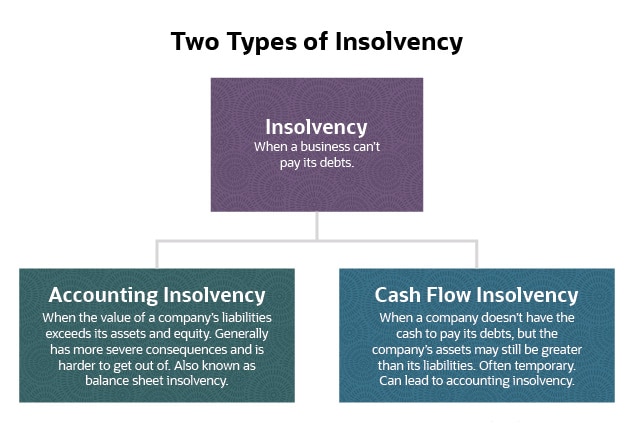Not known Facts About Insolvency Practitioner
Not known Facts About Insolvency Practitioner
Blog Article
Fascination About Insolvency Practitioner
Table of ContentsThe 20-Second Trick For Insolvency PractitionerUnknown Facts About Insolvency PractitionerExcitement About Insolvency PractitionerInsolvency Practitioner for BeginnersHow Insolvency Practitioner can Save You Time, Stress, and Money.9 Simple Techniques For Insolvency PractitionerExcitement About Insolvency Practitioner
Insolvency is when responsibilities are higher than the value of the business, or when a borrower can not pay the financial obligations they owe. A firm can become financially troubled because of a variety of situations that cause poor capital. When encountered with bankruptcy, a company or individual can call creditors directly and restructure financial obligations to pay them off.Service owners might call lenders directly and restructure financial obligations into even more convenient installments. Creditors are typically open to this technique since they want to be paid back and avoid losses, also if the settlement is on a delayed schedule.
9 Easy Facts About Insolvency Practitioner Described
The proprietor develops a proposal describing how the financial debt may be restructured making use of cost decreases or various other prepare for assistance. The proposition shows financial institutions how business may create adequate money flow for successful operations while paying its financial debts. Typically, a forgiven debt may be taken into consideration income by the Irs (IRS).

8 Simple Techniques For Insolvency Practitioner
Business might wind up paying huge amounts of money in damages and be not able to continue procedures. When procedures discontinue, so does the business's income. Absence of revenue causes unsettled bills and financial institutions asking for money owed to them. Some companies become financially troubled because their products or solutions do not advance to fit consumers' altering demands.
Costs surpass earnings and costs stay overdue. Types of insolvency include cash-flow bankruptcy and balance-sheet insolvency. Cash-flow bankruptcy happens when a business has the assets to cover their debts but they are in the incorrect type, such as realty rather than fluid funds. Balance-sheet insolvency, on the other hand, suggests an absence of properties in any type of kind to cover financial debts.
The internal revenue service states that an individual is financially troubled when the total obligations exceed total assets. A bankruptcy, on the various other hand, is an actual court order that shows how a financially troubled individual or organization will settle their creditors, or just how they Check This Out will certainly offer their possessions in order to make the repayments.
The Definitive Guide for Insolvency Practitioner

Recognizing the factors that can cause insolvency, such as overspending, can assist you stop insolvency and its effects.
The Insolvency Practitioner PDFs
It is popular that supervisors and policemans of corporations (and managers of limited obligation firms) owe fiduciary tasks to their companies and their shareholders (or participants). These fiduciary commitments are here defined by state statutes and, though there are variations from one state to another, they commonly include a task of commitment and a task of treatment.
The responsibility of care calls for directors and policemans to work out persistance, to make informed decisions, and to act in good confidence so that their actions are in the most effective rate of interest of the firm. Past the extent of this conversation, some states permit these obligations to be limited either by so noting in the organizational files or conforming with other needs.
4 Easy Facts About Insolvency Practitioner Explained
A lot of states specify insolvency in two means( 1) when a business's liabilities become higher than the amount of its assets or (2) when the firm comes to be not able to pay its debts as they come to be dueand accept both definitions (Insolvency Practitioner). The change in responsibilities takes place due to the fact that when a business is insolvent, there is no value in the company past that owed to the company's financial institutions so that the equity holders no longer have a financial stake in the business
Be mindful about providing investors favoritism at the expenditure of lenders (e.g., accrediting and moneying a dividend or a stock redemption). Beware about preferential treatment in between courses of shareholders. Make sensible efforts to find out all the truths before taking a specific strategy; directors should genuinely think that any decisions made remain in the most effective interests of the company in its totality (i.e., choices will be reviewed in knowledge taking into account the result of such actions on the company).
In any kind of insolvency or bankruptcy proceeding, payments made to certain lenders at the expense of other creditors can be clawed back, especially if there is some connection visite site in between the firm and the lender. Think about recommending at an annual shareholder meeting (or any type of various other meeting of stockholders) a resolution verifying that all previous business decisions and actions taken by the supervisors and officers of the corporation were absorbed good confidence after a workout of reasonable treatment.
Insolvency Practitioner for Dummies
Fully divulge any personal or organization partnerships with parties beyond of purchases involving the company to stay clear of the appearance of a conflict of passion. In assessing prospective fund elevating purchases or a sale of possessions of the struggling company, understand that these transactions might be inspected later due to any type of subsequent growth of supervisors' fiduciary responsibilities to consist of lenders.
Report this page